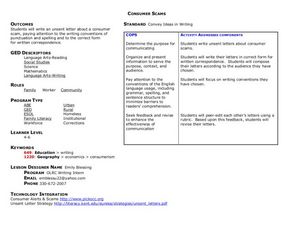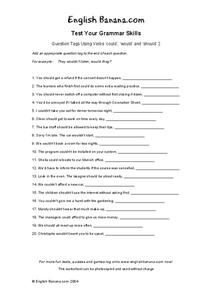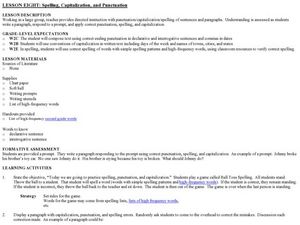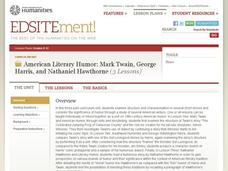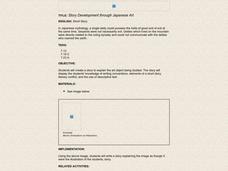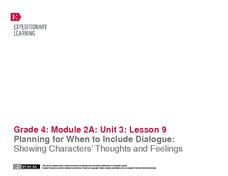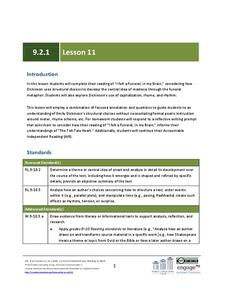Mama's Learning Corner
Is This Sentence Correct? (capitalization and punctuation)
Turn your youngsters into little editors with an exercise that focuses on some of the most basic and important writing conventions: capitalization and punctuation. Learners fix five sentences and then rewrite a sentence using correct...
Curated OER
Writing Conventions: Complete Sentences
Practice composing complete sentences with your class. Sentence starters and endings are written on different strips that learners can paste together to create a complete sentence! Get your pupils familiar with complete sentences with...
Curated OER
Conventions: Strong Verbs
Fifth graders practice using strong verbs. In this conventions lesson, 5th graders brainstorm words to complete sentences and list lively and exciting verbs. Students act out meanings of certain words. Students come up with new ways to...
Curated OER
Mini Beasts and Dialect
Discover the differences in dialect. Inquisitive minds read poems and discuss how words or phrases are different in standard English and other dialects. Using a dictionary, class members locate the definition of each word, find...
Curated OER
The "Write" Stuff: Strategies and Conventions for Imaginative Writing
Fifth graders develop and practice the steps involved in imaginative writing. They follow the steps/worksheets included and write imaginative stories of their own.
University Interscholastic League
English Lesson to Prepare for UIL Spelling and Vocabulary Contest
"i before e. . ." Spelling is easier if kids know the eight basic spelling rules contained in this resource packet.
Curated OER
Conventions - Punctuation Research
Study unusual punctuation marks in this punctuation lesson. Young grammarians work in small groups to research one of the unusual punctuation marks (semi-colon, colon, dash, comma, ellipses, or quotation marks) and discuss how the mark...
Curated OER
A Sample Mini-lesson for Teaching Writing Conventions
Young scholars study writing conventions. In this writing conventions lesson plan, students study writing they have already completed and look for conventions they are already using without realizing. In a small group, young scholars...
Curated OER
Consumer Scams
Letter writing may be outdated but it's a great way to practice English conventions, grammar, and spelling. The class researches consumer scams, then writes a letter about them. They each choose a scam to write about paying close...
Curated OER
Test Your Grammar Skills
Question tags are tough for English language learners. Print this practice sheet to help them use could, would, and should correctly. Twenty questions make up this worksheet, and an answer page is included.
Curated OER
Question Tags Using Verbs Could, Would, and Should - 2
Help your English language learners develop grammar skills! There are 20 questions, and for each question the learner must use a question tag including could, would, or should. An answer sheet is included.
Curated OER
Spelling, Capitalization, and Punctuation
Elementary schoolers explore writing conventions. First they play a ball toss game to practice spelling high frequency words. (A link to a 2nd grade list is attached.) The class works together to correct spelling, punctuation, and...
National Endowment for the Humanities
American Literary Humor: Mark Twain, George Harris, and Nathaniel Hawthorne
Nathaniel Hawthorne as a humorist? Really? The three lessons in this series focus on the the storytelling style, conventions, and literary techniques employed by Hawthorne, George Washington Harris, and Mark Twain.
Curated OER
Tag Questions: Has he? Hasn't he? Had he?
Your English learners can use an online, interactive activity to choose the correct question tag to transform 10 declarative sentences that use the verb to be into interrogatives. They must know to switch the value of the verb from a...
Curated OER
Story Development through Japanese art
A classic Japanese print is attached to this lesson and its up to your class to write a story about it. Pretending the image is an illustration, they use what they know about Japanese mythology to compose a short story describing the...
Curated OER
Does She? Doesn't She? Did She?
Designed for English language learners, this online, interactive activity has kids work with the phrases does she, doesn't she, and did she to complete 10 questions. Each answer is available directly below the question by clicking answer.
Curated OER
Capitalization and Punctuation
First and second graders explore writing conventions. They add question marks or periods to the end of teacher generated sentences on sentence strips. They locate punctuation marks in poems and write original sentences using appropriate...
Curated OER
Blogging
A fun, modern twist on journaling! Instead of responding to prompts in their composition notebook, writers use the Internet to complete blog entries. A sample blog (with prompts) is shown here, and writers are assessed on conventions and...
EngageNY
Planning for When to Include Dialogue: Showing Characters’ Thoughts and Feelings
Young writers examine dialogue conventions, including indentation, quotation marks, and expressing thoughts and feelings through a fictional text. By noticing where and when authors use dialogue, they decide how to incorporate dialogue...
EngageNY
Grade 9 ELA Module 2: Unit 1, Lesson 11
The capitalization rules are strict and inflexible—until you experience the fluid beauty of an Emily Dickinson poem. Ninth graders test their existing knowledge of language arts conventions with the many bent grammar rules in "I Felt a...
EngageNY
Grade 9 ELA Module 4, Unit 1, Lesson 28
As writers continue to revise their argument essays, the focus shifts to editing grammatical conventions, parallel structure, and varying syntax to add interest. After examining model sentences that demonstrate sentence variety, writers...
EngageNY
Determining Cascading Consequences Using The Omnivore’s Dilemma: Industrial Organic Food Chain
Organic versus conventional farming: which option is best? Pupils use Michael Pollan's The Omnivore's Dilemma to determine the cascading consequences of the industrial organic food chain. They work in research teams to create an...
EngageNY
End of Unit 2 Assessment, Part 1: Best First Draft of an Informational Essay
Writers work to create drafts of their end-of-unit assessments relating to A Mighty Long Way and Little Rock Girl 1957. Using computers to create the first versions of their essays, writers emphasize ideas and evidence before focusing...
EngageNY
End of Unit Assessment Parts 1 and 2: Evaluating Arguments and Claims
Which came first: the chicken or the egg? As part of the end-of-unit assessment for The Omnivore’s Dilemma, scholars watch a video about organic eggs versus conventional farm eggs. They use graphic organizers to collect evidence as they...










